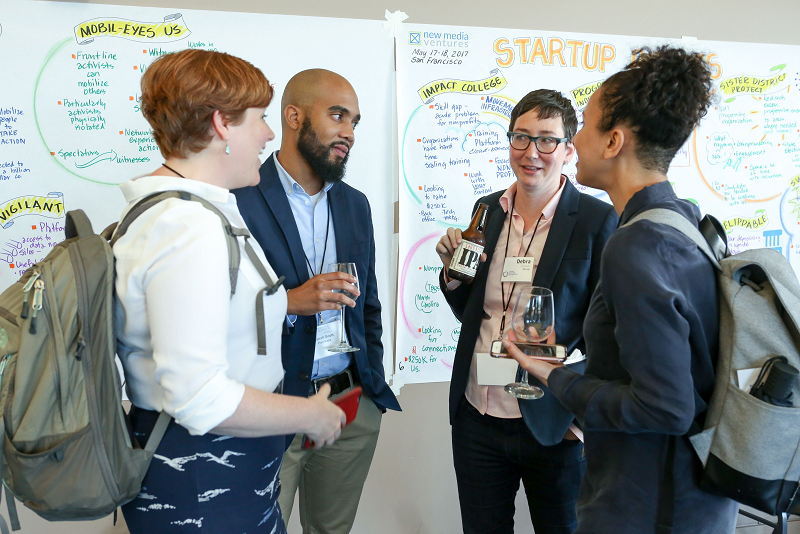Christie George is the Director of New Media Ventures, the first national network of angel investors supporting media and tech startups that disrupt politics and catalyze progressive change. At New Media Ventures, she has overseen a portfolio of more than 60 non-profits and for profits, including Upworthy, Sum of Us
, and Blavity
This interview is part of the Aspen Institute Center for Urban Innovation’s series of conversations with inclusive innovation practitioners.
Jennifer Bradley: What values guide your work?
Christie George: First, transparency, and that manifests for us as being really clear to all of our stakeholders how and what and why we fund. The world of funding tends to be a black box, so as much as possible we try to be transparent about our own decision-making processes and to be candid with prospective investees and grantees as well.

We provide really direct feedback when we don’t invest in someone at the individual start-up level, and write publicly about why we pass on some things because there tend to be common reasons why we can’t invest in people.
Second, we aim to be bold and thoughtful in our decision making. It’s no secret that folks in venture capital have a really high risk tolerance. And as social impact funders we lean into that boldness, as well as think intentionally about the groups of people we invest in as reflective of the larger world that we operate in. So we don’t believe in funding technology for technology’s sake or technology that serves a really limited or homogenous demographic; rather, we aim to fund technology that serves the broader population as it exists today and as it will evolve into the future.
JB: Can you tell us about a situation in which your values were in conflict?
CG: Like many people post the 2016 election, we were trying to figure out how and what we could do in response. We decided to move quickly and set up the Resist and Rebuild Fund that would seek out start-ups that were focused on organizing newly politicized people, addressing new phenomena (like the increase in hate speech online) and dealing with issues like misinformation and fake news.
The world of funding tends to be a black box, so as much as possible we try to be transparent about our own decision-making processes and to be candid with prospective investees and grantees as well.[/quote_embed]
We received 500 applications from tech-enabled start-ups in that space. That experience forced us to confront that we all need to be funding and centering even more experimentation and earlier stage efforts.
We have a diligence process that we’re really proud of, but we recognize that when you’re moving quickly and when you’re funding nascent movements that are not even sure whether they are organizations or not, or what kind of non-profit they are, or whether they are a for-profit, or something between, that the amount of diligence you can do is simply different than under normal circumstances.
And so the tension for us is, how much diligence is enough to satisfy us and our stakeholders? We need to be rigorous, but not so much that we’re burdening very young organizations with questions that they are not yet set up to answer because they are so busy doing the work. It’s a somewhat unprecedented moment that requires things to change almost weekly, and we are continually questioning how to resolve those tensions. As funders, it’s tricky to balance the need for appropriate diligence when new movements are spreading that need to be supported right now.
JB: What are the purpose of values at New Media Ventures? What are they doing for you?
CG: Primarily they offer a north star to help guide decision making – everything from the investment and grantmaking work that we do, but also the hiring that we do. For example, we’re hiring a new associate right now on our investments team and we spent a lot of time thinking about how we can be transparent about that process and how we can ensure that the candidates are reflective of who is out in the world. So we make sure our job descriptions don’t scream implicit bias all over the place and try to de-jargon those job descriptions, and we’ve hosted a webinar for potential candidates so that anybody who was considering applying to the position could ask any and all questions before they wrote us notes of interest.
[quote_embed]We don’t believe in funding technology for technology’s sake or technology that serves a really limited or homogenous demographic; rather, we aim to fund technology that serves the broader population as it exists today and as it will evolve into the future. [/quote_embed]
And our values also help us guide internal team culture. For example, we try to be as candid with each other as we are with external stakeholders. We have 10-10s, which are check-ins between colleagues, every two weeks, and it’s essentially 10 minutes of feedback that goes two ways. It’s a tremendously powerful and effective mechanism for ensuring that challenges are addressed in as real-time as possible. It’s a part of the culture that our head of investments, Julie Menter, brought in from a previous job, and it has been totally transformative for our work culture. It’s expected that feedback is going both ways, not just at performance reviews, but that it is continuous. I think it helps people not do the very human thing of holding on to grudges, slights or misunderstandings.
JB: So tell me about a time that your organizational values guided you through a difficult decision.
CG: I think the way we determine investments exemplifies our values. Although ultimately, I make the final recommendation for investments, we recruit investment screening committees for every investment round that we do, as a way to hold ourselves accountable to our values, cover our blind spots and ensure that our perspectives are reflective of the broader field. It can be a lot of work to manage this process and put into place an additional layer of accountability, but I think it helps us make better decisions and it means that we walk our walk around reflective decision making.
JB: How do you hold yourself accountable to your values? You mentioned some of the accountability of the 10-10, but are there other ways that you make sure that you are doing the things you say you need to do?
CG: We do an impact assessment every year. It’s an anonymous survey for investees and grantees that asks them directly what aspect of our technical assistance has been helpful. It’s really hard as a funder to get honest feedback from people you’ve given money to, as you can imagine. But by making the survey anonymous and by using an external firm, and by communicating and demonstrating that we have a real commitment to incorporating feedback, we have been able to collect what we feel are really blunt assessments of what that we have offered is helpful and what that we’ve offered hasn’t been helpful.
As a result of these assessments we’ve changed our programs for the better! As a grantee of other organizations, we are rarely asked to give direct feedback about our funders’ processes. We know what it’s like to be a grantee, and we’re trying to take our experiences and make them better for those that we support. So I think one of the things that we do well is saying, “Okay, what is the thing that we are doing that may not be actually useful for either us or our grantees and can we change it?”
Christie GeorgeJB: Is there something about values and how values are operational in your work that the questions didn’t elicit?
CG: As an institution that is known for its focus on innovation, we actually care a lot about being known for our focus on inclusion as well. I’ve learned that there are things that you can do to ensure that your processes are more inclusive, your portfolios are more inclusive, and your investments are more reflective of the world that we live in.
[quote_embed]There are things that we can actively do to address the issue of inclusion. It’s not that we have to throw up our hands and say, “There’s nothing we can do.” We’re living proof of that.
We have borrowed practices from other colleagues in the field. I always point to a blog post that the Knight Mozilla Open News Fellows Program did a few years ago as they were looking at their own cohort and saying, “We really need to diversify this cohort.” And the first year, we essentially did everything that they did, and subsequently iterated on that. As a result, our portfolio is both more reflective of the wider world and a stronger portfolio in terms of performance.
There are things that we can actively do to address the issue of inclusion. It’s not that we have to throw up our hands and say, “There’s nothing we can do.” We’re living proof of that.
This interview has been condensed and edited for clarity.
This blog series is supported by the Citi Foundation, a vital early supporter of the Center for Urban Innovation at the Aspen Institute. With the Citi Foundation’s help, the Center convened leading-edge practitioners to develop a shared set of principles to guide a cross-sector approach to inclusive innovation in low- and middle-income neighborhoods, and to determine how the Aspen Institute could support this practice.


